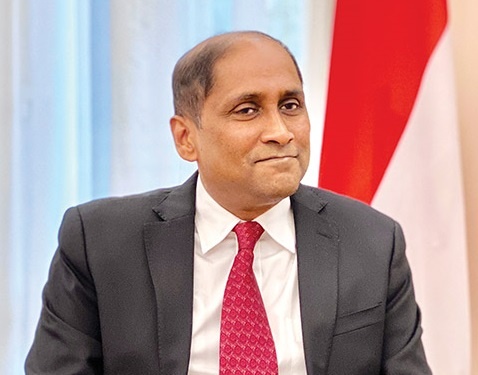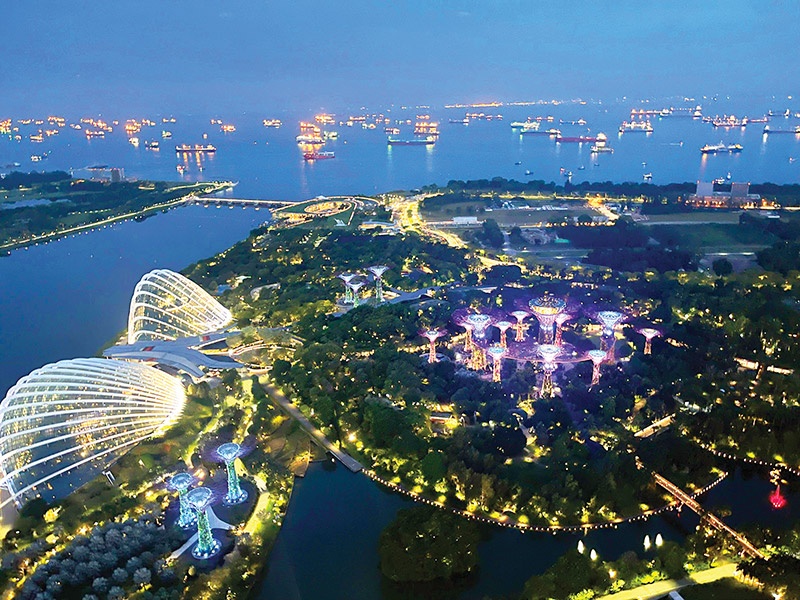Singapore and Vietnam commit to further strong collaborations
In February, Vietnamese State President Nguyen Xuan Phuc paid a state visit to Singapore, with both nations vowing to continue cementing economic ties. How has this cooperation been implemented so far?
 |
| Singaporean Ambassador to Vietnam Jaya Ratnam |
Singapore and Vietnam’s strong economic, trade, and investment ties are underpinned by decades of consistent and meaningful engagement between our governments and peoples. During President Nguyen Xuan Phuc’s state visit to Singapore earlier this year, he and President Halimah Yacob reaffirmed these ties and committed to further collaboration. Our leaders also oversaw the signing of an MoU on economic and trade cooperation between our two countries.
We are starting from a very strong base. Singapore has been the leading source of foreign direct investment into Vietnam for the past two years. Singapore is now Vietnam’s second largest foreign investor, with total registered capital of nearly $70 billion. This demonstrates the confidence that Singaporean investors have in Vietnam’s economic potential and the Vietnamese government’s efforts to boost the ease of doing business here.
Despite the disruptions of the pandemic and the current global economic downturn, Singaporean companies continue to seek new opportunities to diversify and expand their presence in Vietnam.
What sectors are becoming the main magnets for Singaporean investors in Vietnam?
Well, I would like to highlight three sectors. First is supply chains and logistics. Recent global supply chain shocks have shown everyone the importance of this sector. Singapore companies look forward to contributing further expertise, human resources training, and digital solutions to develop the logistics sector in Vietnam.
To cite just one example, when completed, the multimodal Vinh Phuc ICD Logistics Centre established by Singapore’s YCH Group and Vietnam’s T&T Group will strengthen trade connectivity and supply chain resilience in our region.
Second is the green economy. Singapore is keen to work with Vietnam as it increases investments in sustainable infrastructure and renewable energy, with the ambitious goal of achieving net-zero carbon emissions by 2050. The collaboration between Sembcorp and Vietnam Electricity is one promising partnership in this area.
Sembcorp is also working hard to upgrade its network of Vietnam-Singapore industrial parks (VSIPs) to integrate sustainability and innovation. In March, we celebrated the launch of the 11th VSIP in the southern province of Binh Duong, which will, among others, host a carbon-neutral factory owned and operated by Lego Group.
And third is the digital economy. Growing the digital economy will be a key priority for both our countries in the coming decades. Vietnam has identified the digital economy as one of the key drivers of growth that will propel Vietnam toward its ambition of becoming a high-income country by 2045.
Vietnam’s fast-growing middle class and young population make this sector particularly attractive to Singapore companies in e-commerce, digital payments, smart cities, and digital trade.
 |
| Singapore and Vietnam commit to further strong collaborations |
ASEAN is reviewing and upgrading its existing free trade agreements. How have Vietnam and Singapore been cooperating in removing hurdles to increase trade and investment in this regard?
Singapore and Vietnam are two of the strongest proponents of free trade in ASEAN. For decades, we have worked tirelessly to remove trade and investment hurdles – not just between our two nations, but also with partners across the world.
More broadly, we are fervent advocates of free trade both within ASEAN, as well as between our region and the world. We believe that the future prosperity and development of ASEAN will hinge on the bloc’s ability to integrate into global supply chains and build bridges to other regions. As the only two ASEAN countries that have ratified free trade agreements (FTAs) with the EU, Singapore, and Vietnam hope that our agreements will serve as pathfinders to an eventual EU-ASEAN FTA.
We have ratified the Comprehensive and Progressive Agreement for Trans-Pacific Partnership, and hope that other ASEAN member states will join Brunei, Malaysia, Singapore, and Vietnam in signing on to the agreement. We are also party to the Regional Comprehensive Economic Partnership along with the other ASEAN member states. In view of emerging challenges and evolving technologies, we also welcome the reviews of existing ASEAN FTAs to identify new areas for cooperation.
Furthermore, Singapore and Vietnam place a strong emphasis on fostering conducive and attractive investment climates in our respective countries. This synergy has yielded collaborations including the VSIPs as well as investment agreements that accompany most of ASEAN’s FTAs. It is not a coincidence that Vietnam ranks among the top choices for overseas expansion by Singaporean companies, given the ease of doing business and the high levels of mutual trust between our corporations.
Singapore is proud of our steadfast partnership with Vietnam in facilitating 2-way trade and investments. Our successes thus far signal a strong potential for further collaboration as our countries work toward the shared commitment to build a green and digital economy.
Vietnam and Singapore have established a working group on digital economic cooperation. How will this cooperation help Vietnamese and Singaporean businesses cooperate with each other?
Following the signing of the MoU on digital economy cooperation during Vietnamese State President Nguyen Xuan Phuc’s state visit to Singapore in February this year, a joint working group has been tasked with implementing digital economy collaborations between our two countries. The working group will explore new areas of cooperation such as cross-border data flows, cybersecurity, AI governance, and electronic payments, including regulatory sandboxes.
The digital economy, like international trade, is not a zero-sum game. Ultimately, our bilateral digital cooperation aims to establish common norms and interoperable systems. This will provide the foundation for Vietnamese and Singaporean companies to transact with each other easily and securely, and enable them to grow their digital businesses. Establishing common ground in these areas will also help to increase the adoption of emerging technologies in a safe and trusted manner, and promote greater innovation.
Human resource training is another key component of our digital cooperation efforts. Vietnam is the number 1 partner of the Singapore Cooperation Programme (SCP). We were very proud to have trained the 20,000th Vietnamese official under the SCP in 2021, which incidentally also marked the 20th anniversary of the programme.
As Vietnam’s needs evolve, the SCP will continue to evolve alongside it. We have been supporting Vietnam’s Industry 4.0 agenda by sharing our experiences in digital transformation across a range of sectors, including governance, cybersecurity, e-commerce, trade and investment, and judicial reform. We look forward to sustained engagement between our governments, businesses, and societies in our shared drive to digitalise.
| Under the Vietnam-Singapore joint statement on strengthening the strategic partnership and recovery cooperation released in February 2022 during Vietnamese State President Nguyen Xuan Phuc’s state visit to Singapore, both sides have vowed to: Step up cooperation for a digital economy In recognising the importance of digital transformation, both sides welcomed the signing of the MoU on this cooperation. The MoU will operationalise a joint working group to implement concrete digital economy collaborations, with the objective of fostering bilateral and regional digital connectivity. Such collaboration will support the growth of digital businesses and investments in innovation and technology, and improve mutual access to the broader ASEAN market and beyond. Enhance connectivity in supply chains To bolster mutual economic resilience, both sides expressed their commitment to ensuring supply chain connectivity and security. The leaders agreed on the importance of creating a pro-business environment and welcomed further mutually beneficial cooperation such as in infrastructure development and smart logistics. In addition, to facilitate market access in both countries and the region, both sides are working closely to better support businesses and the innovation ecosystem in leveraging their intangible assets and intellectual property to drive innovation and economic growth. The leaders welcomed the signing of the new bilateral Implementation Workplan on Intellectual Property cooperation, thus laying groundwork for talks to finalise the details of the proposed launch of a pilot collaborative search and examination programme. This programme will further enhance connectivity and facilitate the entry of innovative products and services into our two countries. Build a green economy Both leaders underscored the importance of advancing environmental protection, climate action, and sustainable development to ensure the wellbeing of their people and the planet. Given the imperatives of climate action as underscored by COP26, Vietnam welcomed Singapore’s interest in supporting its ongoing energy transition, including investments in low-carbon energy technologies such as energy storage systems. Vietnam also welcomed Singapore’s interest in developing renewable energy sources in the country, with a view to exporting part of the electricity to Singapore in the longer term. This can support the decarbonisation of power grids in both Vietnam and Singapore, in line with broader regional decarbonisation interests. More broadly, the two sides also welcomed closer bilateral and regional cooperation in responding to transboundary challenges such as haze pollution, water quality, and climate change, and seizing opportunities through the circular economy and, in addition, low-carbon development. |
What the stars mean:
★ Poor ★ ★ Promising ★★★ Good ★★★★ Very good ★★★★★ Exceptional
Related Contents
Latest News
More News
- Kurz Vietnam expands Gia Lai factory (February 27, 2026 | 16:37)
- SK Innovation-led consortium wins $2.3 billion LNG project in Nghe An (February 25, 2026 | 07:56)
- THACO opens $70 million manufacturing complex in Danang (February 25, 2026 | 07:54)
- Phu Quoc International Airport expansion approved to meet rising demand (February 24, 2026 | 10:00)
- Bac Giang International Logistics Centre faces land clearance barrier (February 24, 2026 | 08:00)
- Bright prospects abound in European investment (February 19, 2026 | 20:27)
- Internal strengths attest to commitment to progress (February 19, 2026 | 20:13)
- Vietnam, New Zealand seek level-up in ties (February 19, 2026 | 18:06)
- Untapped potential in relations with Indonesia (February 19, 2026 | 17:56)
- German strengths match Vietnamese aspirations (February 19, 2026 | 17:40)

 Tag:
Tag:




















 Mobile Version
Mobile Version